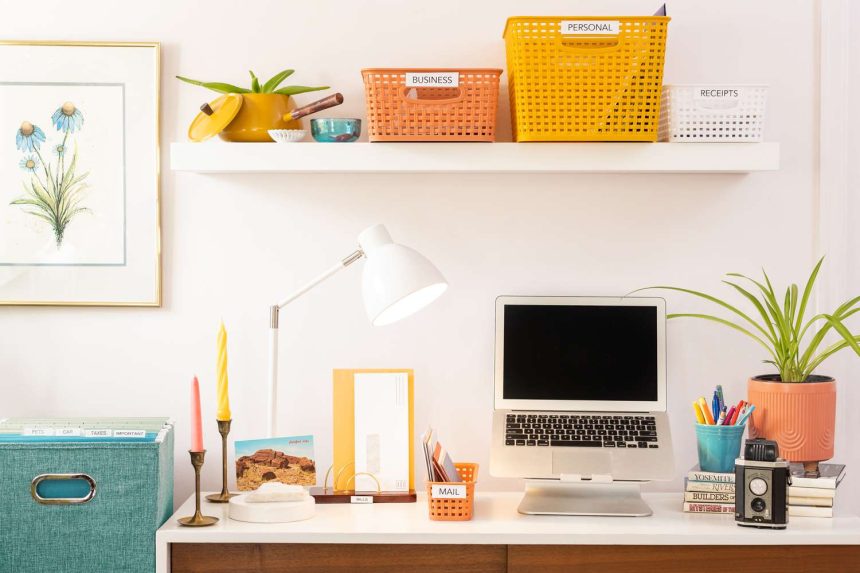Just as interior designers know what’s in style when it comes to home decor, professional organizers have their finger on the pulse of the most effective storage trends. Because they’re constantly clearing clutter and creating working systems in clients’ homes, organizers know what trends work and which fads you should skip. As we head into a new year, we asked several pros to share their top home organizing predictions for 2025.
Many of their answers are unsurprising, as they align with the values of today’s climate. Think: environmentally-friendly solutions, self-care routines, and using technology to its full potential. If you’re hoping to make positive changes in your home this year, take inspiration from the organizing trends these experts are using (and loving) right now.
1. Treat Organization as a Form of Self Care
Getting organized can actually be a form of self-care—and it’s one that can make a big impact on your daily routine. Janelle Azar, professional organizer and owner of A Meaningful Space, predicts that “[we’ll see] a stronger focus on how organization impacts mental health and well-being.”
And she’s not alone: Lisa Eckerle, owner of The Designer Organizer, describes how indulging in some home organization self-care is on the rise—again. “Women in my book club were sharing how this is a goal of theirs for 2025—to create a living space that makes them feel lighter and in more control,” she says. “While this isn’t a new notion, I think it will come back as a trend next year since we got away from it a little after the pandemic when we all spent a ton of time in our homes.”
Eckerle explains that once we started getting out more and became busy again, much of the sense of order that was created disappeared—but it’s not too late to bring that back. “Organizing helps you accomplish a safe space by decluttering, eliminating physical chaos, reducing decision fatigue, and creating pockets of calm,” she says.
2. Embrace Intentional, Economical, and Sustainable Organizing Solutions
Eco-friendly organizing methods and products are here to stay. But, this year, being smart about their purpose and price is also cool. “With inflation, people are trying to take better care of the possessions they have now,” Eckerle says. “By caring for your belongings with intention, you can create a space that feels beautiful, functional, and enduring.”
She suggests some sustainable tips for storing your things safely:
- Use fabric-lined baskets for towels and clothes so they don’t snag on the material.
- Use shoe racks in the mudroom or entryway so they (and your floors) stay clean.
- Use water-resistant drawer organizers (such as bamboo) in the kitchen to ensure utensils don’t rust.
You can also choose to be intentional, economical, and sustainable when letting go. “Decluttering has become more thoughtful,” says Martha Carol Stewart, CEO and founder of Chaos Organizing. “It’s not just about getting rid of things; it’s about preserving memories and giving back. We love helping clients donate items to local charities that benefit the community, creating a win for everyone involved.”
Meg MacDonald
3. Use Tech to Get More Organized
The terms AI and ChatGPT are now part of our everyday vocabulary, and people are using the technology to stay organized in all aspects of their lives. Between hacks to help you digitally declutter and smart home devices to keep on top of routines, there are plenty of ways you can take full advantage of today’s technology.
And, of course, there’s always a push to become entirely paperless and rely on digital files. Azar relies on secure apps, such as Trustworthy, to streamline important paperwork. On the other hand, Kim Snodgrass, owner and founder of Rustic Home Organizing, has witnessed a return to the old-fashioned pen and paper.
“While the digital age continues to influence our lives, a surprising shift is occurring: a return to analog methods,” she says. “Handwritten lists, planners, and notes are making a comeback, as many find a deeper connection to their thoughts and tasks when they’re physically written down.”
If you enjoy the satisfaction of writing something on your to-do list and then crossing it off, but don’t want the physical paper clutter, consider using dry-erase boards or erasable notebooks instead.
4. Aim for Accessibility (Especially If Aging in Place)
With many seniors deciding to age in place, there’s no rush for them, or their stuff, to go anywhere anytime soon. This eliminates the frantic decluttering of decades worth of items in a short period of time when an older family member moves into an assisted living facility. That’s not to say they shouldn’t work on decluttering, but there are other factors to consider.
“This is one of the most significant shifts in home organizing as more people prioritize staying in their homes safely and comfortably,” Stewart says. She’s actually added an occupational therapist to her team who specializes in working with older adults, helping them to make their homes not only organized but also accessible and functional. “Aging in place is about blending practicality with compassion,” she says.
A few ways they make that happen are by setting up systems with safety and cognitive support in mind. “We place frequently used items at waist height to minimize strain and the risk of falls, create simplified layouts, and use clear labeling to make navigating spaces easier,” Stewart says. Some products she suggests will be on the rise are pull-out shelves, lazy susans, and adjustable-height shelving. “Large-font labeling is a consistent request to support vision and memory needs,” she adds.
Note that this organizing approach doesn’t only apply to those aging in place, but can also be life-changing for busy families, parents with small children, or anyone with frequent house guests.
Ali Harper
5. Curate Storage Systems That Work For You
The beauty of getting organized is that you can tailor it to fit your style, as well as your space and stuff. “Many consumers realize the importance of choosing the right size and style to avoid clutter, Snodgrass says. This looks like buying fewer trendy containers and focusing more on custom solutions, including budget-friendly ones. “We can expect to see a growing demand for deep storage to accommodate the larger cabinets and closets found in modern homes,” she says.
Azar agrees, suggesting we say goodbye to cookie-cutter, ‘Pinterest perfect’ organization styles—including the popular ROYGBIV method for arranging items. “While color-coding has its place, the focus will shift towards creating functional systems that reflect your unique style,” Azar says. “Customized solutions tailored to individual needs and lifestyles are in.”






